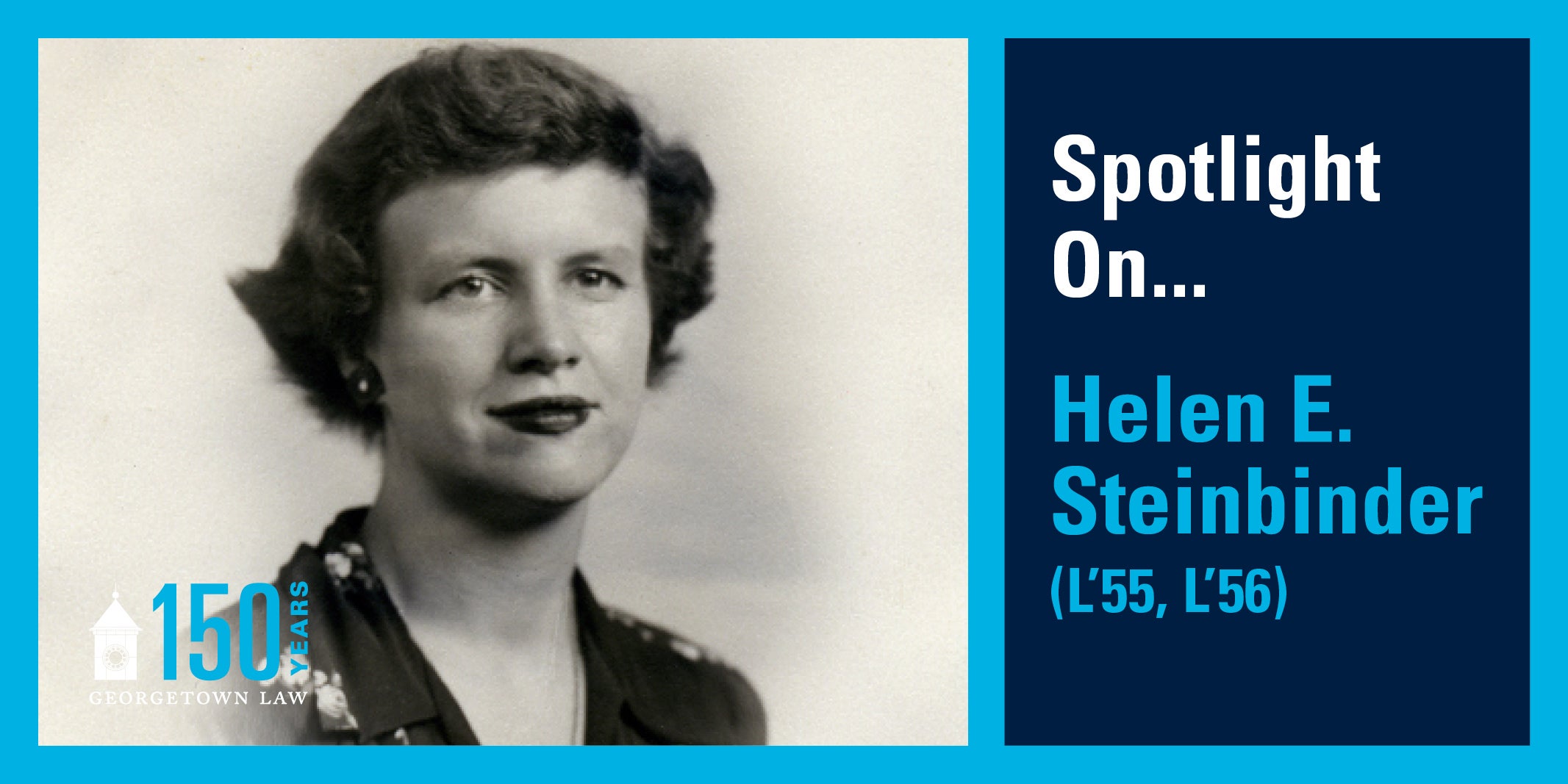
Professor Helen Elsie Steinbinder (L’55, L’56) was a trailblazer who paved the way for the next generation of female lawyers.
She was born in New York City and graduated from Manhattanville College in Purchase, New York. She earned a Masters of Library Science degree at Columbia University, and then became among the first eight women admitted to Georgetown Law. She was one of the first two women to receive a Georgetown Law LL.B. degree — the J.D. of its day — and also one of the first two women to receive an LL.M.
In 1957, Steinbinder was hired by Georgetown Law as the first woman on the full-time faculty. Later, she became the first woman to receive tenure. Known for her strong voice, Professor Steinbinder prided herself on speaking without a microphone when lecturing her large classroom. She taught classes in real estate and property and also worked as a faculty adviser for the student-published magazine Res Ipsa Loquitur. She retired from Georgetown Law in 1988 and passed away in 2015.
Her contributions are evident in our diverse 2020 entering class, comprising 57% women. We are grateful to Professor Steinbinder and for the essential role she played in our development as a Law School. To learn more about our journey of progress, visit the 150th Anniversary Georgetown Law Timeline.
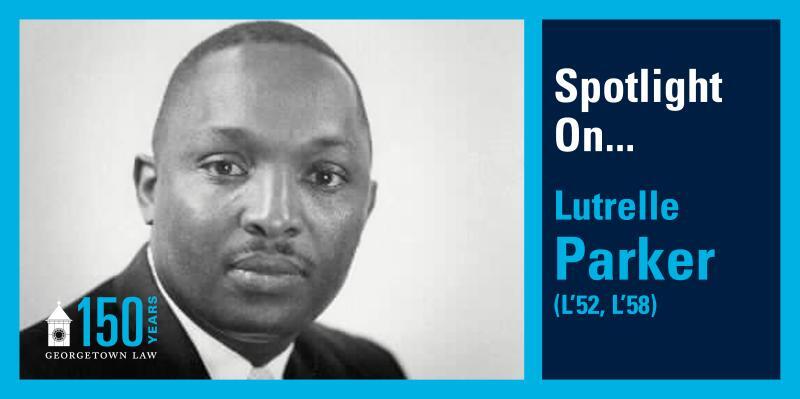
Judge Lutrelle F. Parker, Sr. (L’52, L’58) was one of the first four African American students admitted to Georgetown Law and an alumnus whose life exemplified the excellence and ethic of service for which the Law Center is known. Parker began an impressive career at the U.S. Patent Office as a patent examiner. He was promoted to trial attorney and rose through the ranks, later serving in the U.S. Senate–confirmed positions of Examiner-In-Chief and Deputy Commissioner.
He served as a judge on the Board of Patent Appeals from 1980 until retiring in 1986. For his significant contributions, Judge Parker was awarded the Patent Office Superior Accomplishment and Superior Performance awards and a Meritorious Service Award. He was asked by President Johnson to serve on a commission on Patent Office reform and in 1970 he received a Presidential Certificate of Commendation for his exceptional service to others. The U.S. Patent and Trademark Office’s law library is named in his honor.
Judge Parker was dedicated to giving back and served as a volunteer leader on many community boards throughout his life. During World War II, he served as one of the first commissioned black officers in the U.S. Navy. After war service in the Pacific theater, he joined the reserves and eventually retired with the rank of captain in 1982. His story is part of a long legacy of military veterans and military-connected law students at Georgetown.
Judge Parker also served on many boards including the Arlington Hospital Foundation, National Capital Area Hospital Council, George Mason University Foundation, Virginia State Council of Higher Education, and National Old Dominion Bar. He was an active volunteer for his local YMCA and a member of the Arlington Men’s Chorus.
The legacy of Lutrelle Parker and his fellow trailblazers is especially meaningful to Georgetown Law, and the progress they began has only accelerated. Georgetown Law’s continuing journey toward diversity and inclusion has resulted in a 2020 first-year J.D. class with 32% students of color and 15% African American students — the highest proportions to date in both regards.
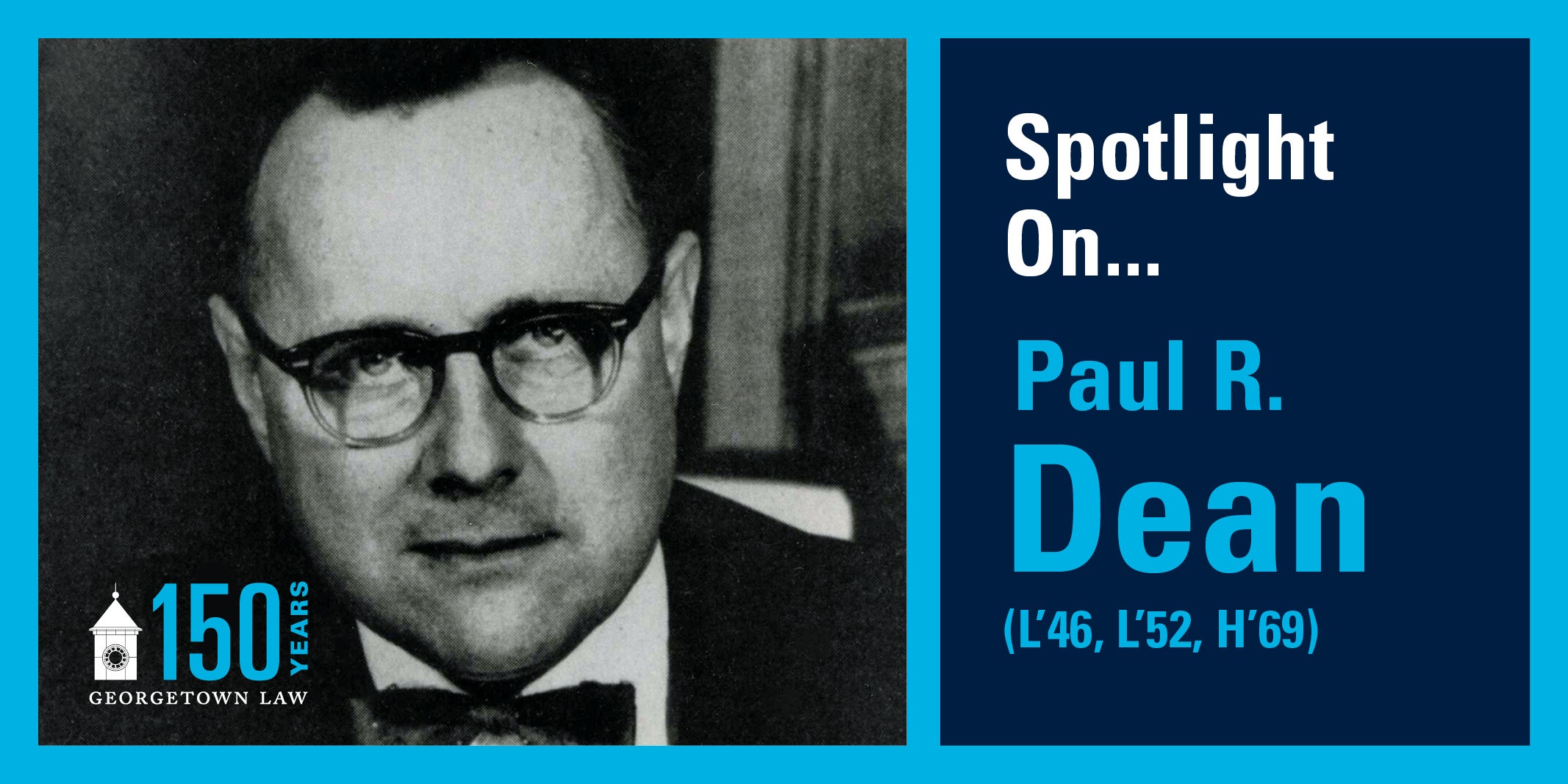
A transformational figure in Georgetown Law’s history, Paul R. Dean (L’46, L’52, H’69) is widely regarded as the founding Dean of the modern Law Center. He became Dean of the Law School in 1954 and served until 1969. During his tenure, he initiated extensive reforms toward a vision of self-governance and academic freedom for the faculty, capital expansion, and heightened standards of academic excellence for Georgetown Law.
Paul Dean was born in 1918 and raised in Youngstown, Ohio. After graduating from Youngstown State, he enrolled at Georgetown Law. During World War II, his education paused for two years of naval service in the Pacific. An excellent student, he served as Editor-in-Chief of the Georgetown Law Journal. After graduating in 1946, a bidding war for his services broke out among firms and universities. Georgetown’s Law School Regent Francis Lucey won, with Dean becoming a full-time faculty member in 1947.
As Dean, he helped reform the structure of the school’s internal governance and leadership, while laying the groundwork for its rise in reputation as an elite institution. He strengthened the evening division, helped launch the clinical education program with the E. Barrett Prettyman Fellowship Program, and rebranded the Law School as “Georgetown University Law Center,” setting the tone for decades to come. Recognizing the need for a new home, he led a movement to begin construction on McDonough Hall, the first building of the modern campus.
He is memorialized with the Paul Regis Dean Leadership Chair, an esteemed faculty position into which current Dean William M. Treanor was installed in 2019. His name also graces the Paul R. Dean Alumni Award, established in 1994 and annually awarded during Reunion Weekend. The award is given to graduates who have exhibited leadership to their alma mater and the legal profession. An entry by Professor Daniel Ernst on the Georgetown Law Faculty Blog contains additional information about his extraordinary life of leadership.
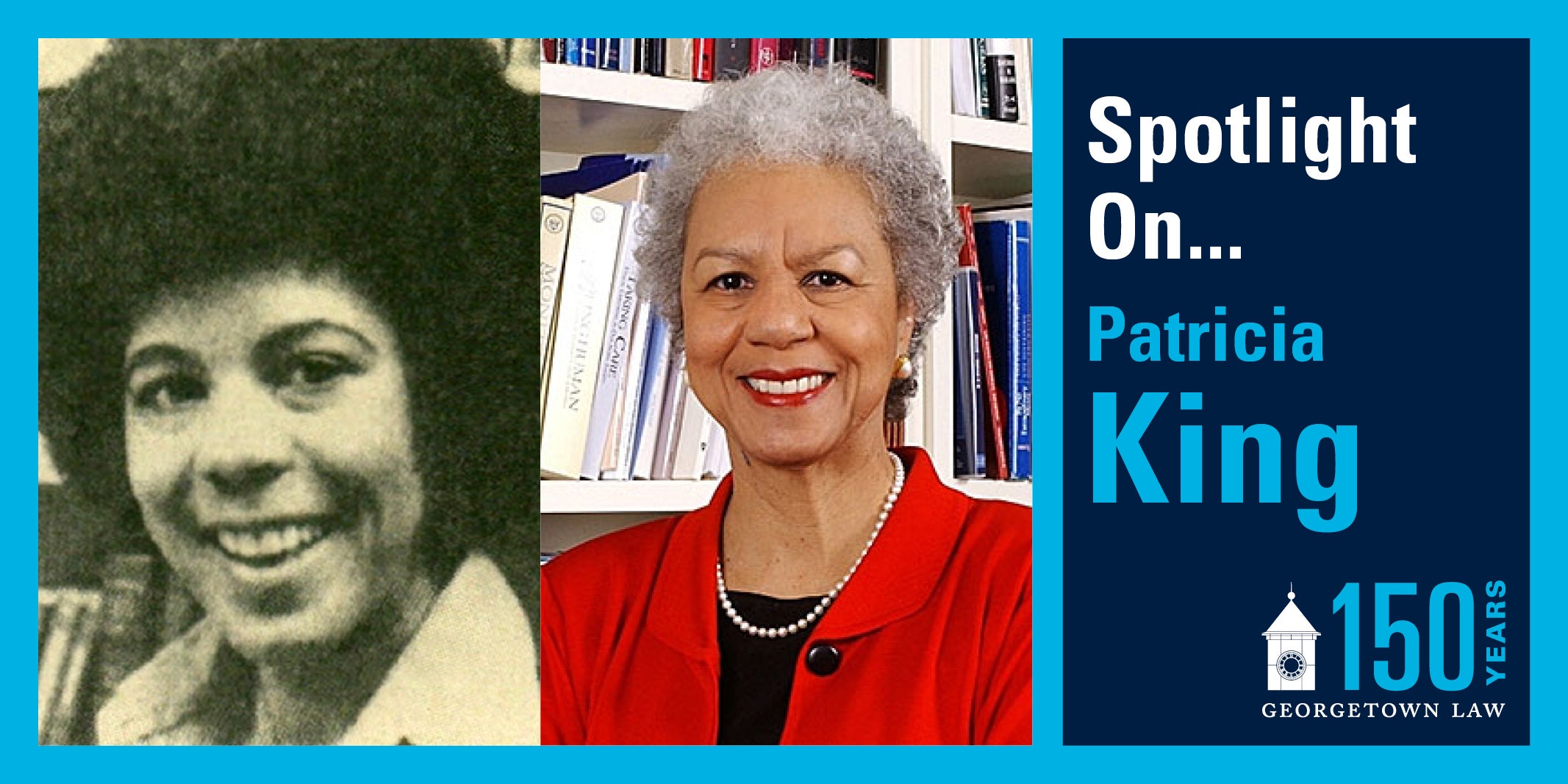
Professor Emerita Patricia King was the first African American and person of color to receive tenure at Georgetown Law. She grew up in Norfolk, VA, with a supportive, encouraging mother. She graduated as valedictorian of Booker T. Washington High School, with honors in religion and philosophy from Wheaton College in Norton, MA, and with a J.D. from Harvard Law School.
After several years serving in civil rights–oriented posts, she began teaching at Georgetown Law. Professor Emerita King’s expertise became the intersection of law, medicine, ethics and public policy. A bioethics pioneer, she co-authored Cases and Materials on Law, Science and Medicine and served on the National Commission for the Protection of Human Subjects of Biomedical and Behavioral Research, President’s Advisory Committee on Human Radiation Experiments, and NIH National Center for Human Genome Research Working Group on Ethics, Legal, and Social Issues.
In 1996, she was appointed Carmack Waterhouse Professor of Law, Medicine, Ethics, and Public Policy. She retired with emerita status in 2017 and continues to serve as a Faculty Affiliate of Georgetown’s Kennedy Institute of Ethics and on the Georgetown Gender Justice Initiative Advisory Board, National Academy of Medicine Board of Health Science Policy, National Academies Standing Committee on Emerging Infectious Diseases and 21st Century Health Threats, and Committee on Ethical, Legal, and Regulatory Issues Associated with Neural Chimeras and Organoids.
As part of the 150th Anniversary Year of Celebration, Professor Emerita King appeared as a panelist in the live virtual event Our History — The Past 50 Years.
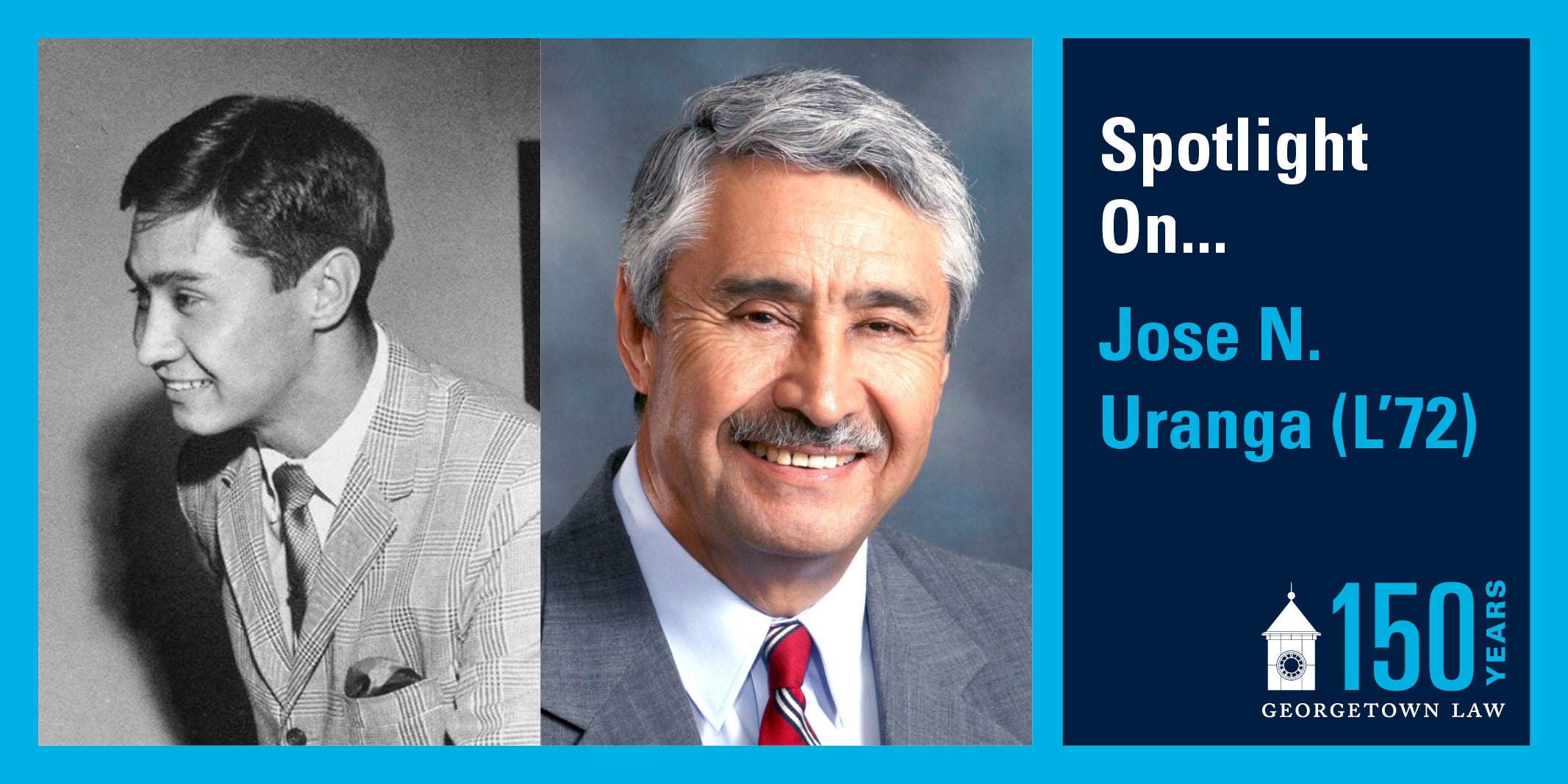
José N. Uranga (L’72) led the movement to establish the Georgetown Law chapter of the La Raza National Law Students Association. It later merged with a second Latin American student organization, La Alianza del Derecho, and then became known as the Latin American Law Students Association. LALSA continues to this day, growing and supporting the Latino and Hispanic campus community.
As the first president of the Georgetown chapter, Uranga helped bring La Raza’s national convention to D.C. He secured the participation of Sen. Joseph Montoya, Sen. Ted Kennedy, and leaders of national Hispanic organizations for a discussion he moderated on Hispanic legal issues.
In 1969 Uranga was the only Latino student in his entering class. As a student, with approval and funding from Dean Adrian Fisher, he visited colleges around the country recruiting Latino students. By the time he graduated, Georgetown Law had the most Latino students enrolled of any law school east of the Mississippi. Uranga speaks about this in a video recording included on the 150th Anniversary Community Memories page.
After graduating, Uranga had a successful career as an environmental lawyer. In retirement, he has published a trilogy of historical fiction novels about the Hispanic experience in the American Southwest.
José Uranga’s impact on Georgetown Law is apparent in today’s strong enrollment figures for Latino students and the continued vibrance of LALSA. Thank you to José Uranga for playing such an essential role in our history.
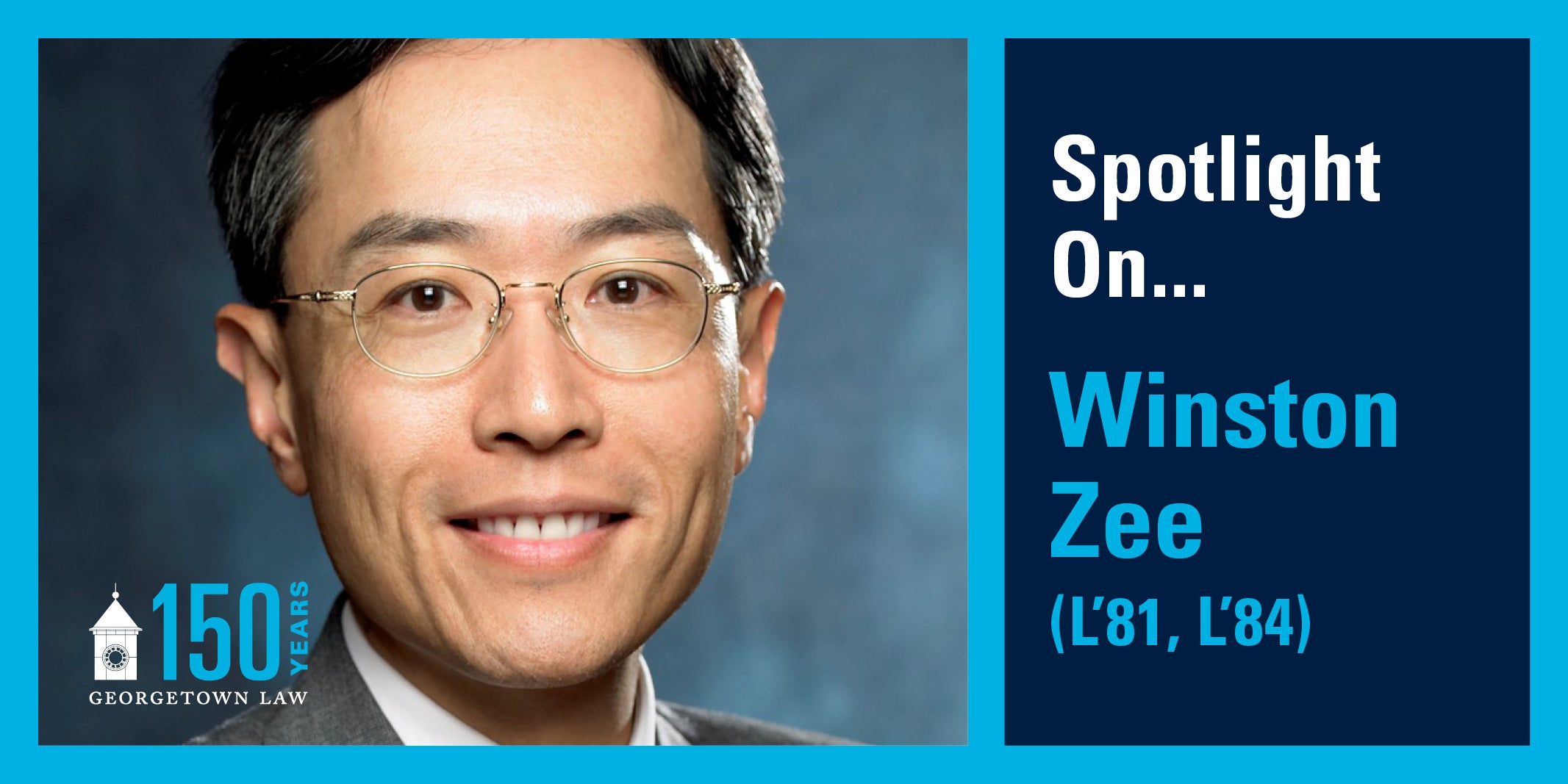
Winston Zee (L’81, L’84) is one of Georgetown Law’s most generous and high-impact alumni. His gifts have supported legal scholarship and programming focused on Asia, the expansion and upkeep of our world-class campus, and the establishment of multiple scholarships for deserving students.
Born and raised in Hong Kong, Mr. Zee is a business lawyer with a passion for helping parties bridge legal and cultural gaps through transnational investments. He received his J.D., magna cum laude, from Georgetown Law in 1981 and his LL.M in Taxation in 1984. After graduating, he joined the global law firm Baker & McKenzie, where he served as Asia Pacific chairman from 2012 to 2014. After retiring, he joined the faculty of Shanghai Jiao Tong University KoGuan Law School. There, he uses his Georgetown training and years of experience to develop a new generation of transnational lawyers.
Mr. Zee has chaired Georgetown Law’s Asian Law Alumni Advisory Board since 2010 and served on its Board of Visitors since 2017. He has said that he believes the international perspective Georgetown offers is increasingly important within today’s world.
In 2016, he received Georgetown Law’s prestigious Paul R. Dean Alumni Award. In 2020, he was selected to receive the University’s John Carroll Award, recognizing alumni whose achievements and record of service exemplify the ideals and traditions of Georgetown and its founder. We are very grateful to Winston Zee for his generosity and leadership.
For questions about the 150th Anniversary’s website, programming, or materials, please contact William Bailey, Senior Director of Campaign Management and Special Initiatives, at (202) 662-9671 or William.Bailey@georgetown.edu.